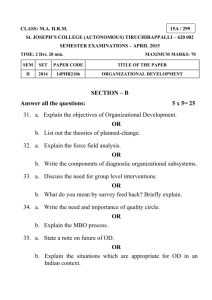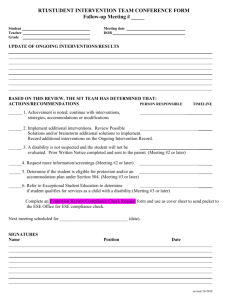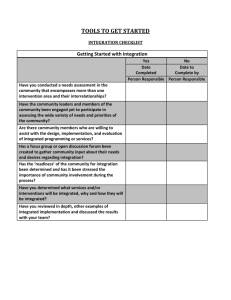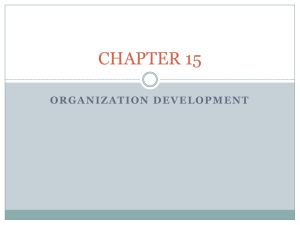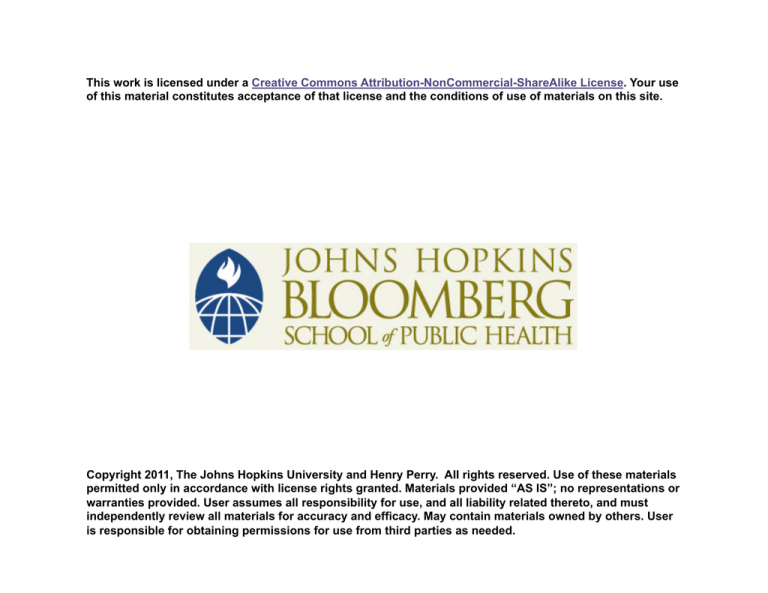
This work is licensed under a Creative Commons Attribution-NonCommercial-ShareAlike License. Your use
of this material constitutes acceptance of that license and the conditions of use of materials on this site.
Copyright 2011, The Johns Hopkins University and Henry Perry. All rights reserved. Use of these materials
permitted only in accordance with license rights granted. Materials provided “AS IS”; no representations or
warranties provided. User assumes all responsibility for use, and all liability related thereto, and must
independently review all materials for accuracy and efficacy. May contain materials owned by others. User
is responsible for obtaining permissions for use from third parties as needed.
A Comprehensive Review of the Effectiveness of
Community-Based Primary Health Care
in Improving Child Health
Henry Perry, MD, PhD, MPH
Johns Hopkins University
Progress in Millennium Development Goals (MDG) 4
Only 19 of 68 countries with 97% of under-five deaths are on track
to achieve MDG 4
Botswana, Eritrea, and Malawi are the only countries in Africa on
track
3
Outline
Describe the review and methods
A few observations about specific interventions
Evidence concerning integrated approaches
Cross-cutting themes: scaling-up/CHWs
Findings, recommendations, and conclusions
4
Section A
Individual Specific Interventions
Sponsors
The Working Group on CBPHC of the International Health Section of
APHA
In collaboration with:
- UNICEF
- WHO
- The World Bank
With support from Future Generations
6
Study Goals
Study questions
- How strong is the evidence that CBPHC can improve child
health?
- What are the conditions needed for community-based
interventions to be effective?
- What lessons have been learned?
- What additional research is needed?
- What are the policy implications?
7
Study Goals
Study outcomes
- Report to expert panel, journal supplement
- Consensus statement of expert review panel
- Summary publication of key findings in high-profile journal and
possibly publication of book with details
8
Identification of Documents for the Review
One or more interventions with outcome assessment
Main outcome measures:
- Change in mortality
- Change in nutritional status
- Change in coverage of a key child survival intervention
9
Sources and Selection Criteria
Computerized database searches—Pubmed
Broadcasts to global health list-serves
Knowledgeable persons
Reviews of studies also included where appropriate
Documents from grey literature included
10
Document Review Process
PUBMED search produced 3,224 documents
- “Community health” and
- “Infant/child morbidity or mortality” and
- “Developing countries”
Each document assessed for inclusion by two independent reviewers
Each document which qualified for inclusion was reviewed by two
independent reviewers
Standardized data extraction forms used for single studies
Each pair of reviews consolidated by a third senior reviewer into a
single data sheet created as an EPI INFO questionnaire for further
analysis
Over 400 studies and 50 review articles
11
Study Personnel
Directors: Henry Perry and Paul Freeman
Coordinators: Sundeep Gupta and Bahie Rassekh
70 reviewers
- Mostly volunteer
- Including many Hopkins students
12
Members of the Expert Review Panel
Dr. Carl Taylor, Chairperson, Johns Hopkins University, Baltimore,
MD (now deceased)
Dr. Raj Arole, Comprehensive Rural Health Project, Jamkhed, India
Dr. Rajiv Bahl, World Health Organization, Geneva
Dr. Abhay Bang, Society for Education, Action and Education
(SEARCH), Gadchiroli, India
Dr. Robert Black, Johns Hopkins University, Baltimore, MD, USA
Dr. Anthony Costello, University College of London, London, UK
13
Members of the Expert Review Panel
Betty Kirkwood, London School of Hygiene and Tropical Medicine,
London, UK
Rudolph Knippenberg, UNICEF, New York, NY
Claudio Lanata, Institute of Nutritional Research, Lima, Peru
Dr. Adetokumbo Lucas, Harvard University, Ibidan, Nigeria
Dr. Pang Ruyan, WHO, Manila, Philippines
Dr. David Sanders, University of Western Cape, Capetown, South
Africa
Dr. Agnes Soucat, World Bank, Washington, DC
Dr. Mary Taylor, Gates Foundation
14
Community-Based Primary Health Care (CBPHC)
How would you define community-based primary health care?
15
What Is CBPHC?
Broad-based definition
Any interventions outside of health facilities or in coordination with
health facilities with a direct or indirect effect on health
16
Main Findings
Main findings
17
Specific Interventions
Specific interventions
18
CBPHC Interventions for Improving Child Health
BCG, polio, diphtheria, pertussis, tetanus, measles, haemophilus
influenza Type b (Hib), pneumococcus, and rotavirus immunizations
for children and tetanus immunization for mothers and women of
reproductive age
Provision of preventative vitamin A supplements to all children 6–59
months of age and to post-partum mothers
Provision of preventative zinc supplements to all children 6–59
months of age
Promotion of breastfeeding immediately after birth, exclusive
breastfeeding during the first six months of life, and continued
breastfeeding after six months of age
Promotion of appropriate complementary feeding beginning at six
months of age
Promotion of hygiene (including hand-washing), safe water, and
sanitation
19
CBPHC Interventions for Improving Child Health
Promotion of oral rehydration therapy (ORT) and zinc
supplementation for children with diarrhea
Promotion of clean delivery, especially in settings in which most
births occur at home and hygiene is poor
Community-based treatment of childhood pneumonia
Home-based neonatal care, which includes promotion of immediate
and exclusive breastfeeding, promotion of cleanliness, prevention of
hypothermia, and diagnosis and treatment of neonatal sepsis by
community health workers (CHWs)
Community-based rehabilitation of children with protein-calorie
malnutrition through provision of food supplementation (including
rehabilitation of children with severe acute malnutrition through
the provision of ready-to-use therapeutic foods)
Insecticide-treated bednets (ITNs) in malaria-endemic areas
Indoor residual spraying in malaria-endemic areas
20
CBPHC Interventions for Improving Child Health
Community-based treatment of malaria
Intermittent preventive treatment during pregnancy (IPTp) in
malaria-endemic areas
Intermittent preventive treatment during infancy (IPTi) of malaria in
malaria-endemic areas
Detection and treatment of syphilis in pregnant women in areas of
high prevalence
Prevention of mother-to-child transmission (PMTCT) of HIV infection
Iodine supplementation in iodine-deficient areas where fortified salt
is not consumed
21
Contraception
Estimated Child Deaths that Could Be Averted in Six African Countries
by Meeting Unmet Need for Contraception, 2005–2015
Source: Henry Mosley
22
Review of Child Survival, Growth, and Development
http://whqlibdoc.who.int/publications/2004/9241591501.pdf
23
Select Review Findings: Effective CBPHC Interventions
Community-based treatment of pneumonia is effective
- Narangwal Project was one of the first to demonstrate this
Water and sanitation interventions are effective
Hand-washing reduces rates of childhood diarrhea and pneumonia
Each of the following contributes to child health:
- Family planning
- Women’s empowerment
- Cash transfers
- Micro-credit
- Overall social/political environment
24
Community-Based Treatment of Childhood Pneumonia
Meta-Analysis of Community-Based Management
of Childhood Pneumonia (Nine Studies)
Impact on pneumonia:
specific mortality
Impact on overall
mortality
Neonatal period
36%
24%
First year of life
36%
20%
Under-five
42%
24%
Age period
Source: Sazawal and Black. (2003). Lancet Infectious Diseases.
25
Meta-Analysis of Studies to Improve Drinking Water
33 studies
Types
- Household-based (chlorination, filtration, flocculation/
disinfection, solar disinfection)
- Source-based chlorination
Overall, 39% reduced risk of childhood diarrhea
Addition of other interventions—such as hygiene instruction,
improved water vessel storage, improved sanitation, and improved
water supply—does not increase effectiveness
Source: Clasen et al., (2007). British Medical Journal.
26
Water, Sanitation, and Hygiene
Review of the effect of water, sanitation, and hygiene for the
prevention of diarrhea
“We propose diarrhoea risk reductions of
48,17 and 36% associated respectively with
hand-washing with soap, improved water
quality and excreta disposal … ”
—Cairncross et al.,
International Journal of Epidemiology
(2010)
27
Community-Based Management of Childhood Malaria
Review of nine studies
Two studies showed no health impact
Two studies “suggested” a decreased progression to severe malaria
Only one of four studies assessing mortality impact demonstrated an
effect (but this was a randomized controlled trial published in The
Lancet)
Source: Hopkins et al. (2007). Malaria Journal.
28
Nutrition Interventions
Review of Potential Effectiveness of Nutrition Interventions
Level of
coverage of
all
interventions
Percentage of
Percentage of
children with stunting
deaths averted by averted by 36 months
36 months of age of age
Percentage of
DALYs averted
70%
17.3%
23.6%
17.5%
90%
22.4%
32.4%
22.7%
99%
24.7%
35.8%
25.1%
In the 36 countries with 90% of children with stunting
All interventions are community-based
Source: Bhutta et al. (2008). Lancet.
29
Review of Conditional Cash Transfers
10 studies
Increased use of health services found (five studies)
Unclear effect on use of immunizations services (four studies)
Effects on growth found in subgroups of children (two studies)
Unclear effects on health status (anemia, mothers’ reports of
child’s health)
Source: Legarde et al. (2007). JAMA.
30




